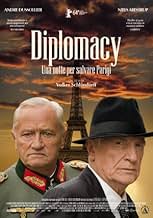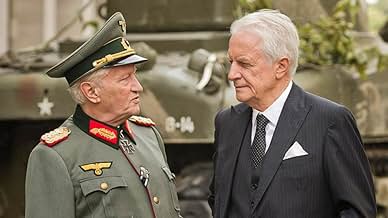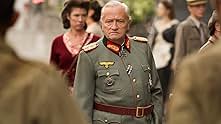Diplomatie
- 2014
- Tous publics
- 1h 24min
NOTE IMDb
7,1/10
6,1 k
MA NOTE
Un drame historique qui dépeint la relation entre Dietrich von Choltitz, le gouverneur militaire allemand de Paris occupé, et le consul général suédois Raoul Nordling.Un drame historique qui dépeint la relation entre Dietrich von Choltitz, le gouverneur militaire allemand de Paris occupé, et le consul général suédois Raoul Nordling.Un drame historique qui dépeint la relation entre Dietrich von Choltitz, le gouverneur militaire allemand de Paris occupé, et le consul général suédois Raoul Nordling.
- Réalisation
- Scénario
- Casting principal
- Récompenses
- 5 victoires et 6 nominations au total
Pierre-Marie Rochefort-Schneider
- Opérateur radio
- (as Pierre-Marie Rochefort)
Avis à la une
When Hitler's army was on the verge of withdrawal from Paris, they were ordered to destroy all major structures, such as Louvre, Eiffel Tower et al and to pulverize the city. We all know that the city still stands with all its monuments. It is the story of that fateful night when the destiny of a city hung in balance.
The acting is great. The run time is super short (75 minutes). The twists are many. The dialogues are sharp. The debates between the two principals are thought provoking and force you to empathize.
Highly recommended. Well made.
The acting is great. The run time is super short (75 minutes). The twists are many. The dialogues are sharp. The debates between the two principals are thought provoking and force you to empathize.
Highly recommended. Well made.
There's an old joke - how many Frenchmen does it take to defend Paris? Answer: No one knows. It's never happened.
That actually comes up in this film, "Diplomatie," from 2014, based on a play. It's basically a two-person movie about the conversation Swedish consulate Raoul Nordling (André Dussollier) has with Général von Choltitz (Niels Arestrup).
Germany has basically lost the war; the Allies are en route to Germany, and Hitler has decided to make Paris scorched earth, killing millions and razing the city to rubble. There was no strategic reason to do this. He was just feeling especially spiteful that day and figuring, why leave the Allies with this jewel.
Nordling, a Paris resident, comes to ask von Choltitz to spare Paris. Von Choltitz has never defied an order, no matter how he felt about it, and he is very dismissive of Nordling. He points out that there's practically nothing left of Hamburg - did those civilians not matter?
He tells Nordling that the Parisians gave the Nazis Paris "with their legs open - like whores. We can do what we want with it." They go back and forth on this, and von Choltitz later admits that Hitler has gone off the rails. But there's nothing he can do - his family will pay the price if he doesn't do as he's told.
This is an excellent film with superb acting by both men. The most chilling scene takes place in the beginning, when von Choltitz and soldiers go over the plan to destroy Paris. It's absolutely shocking. They go through every landmark, every famous street, discussing how it will be taken down, how the city will be flooded when they break through the river barriers. It's awful.
I knew right away that Neils Arestup was not German - I could understand every word he said. When real Germans speak, I can't. He does a masterful job, so aggressive and cold in the beginning, and then gradually weakening. André Dussollier, with his quiet performance, is excellent in his persuasiveness.
I believe the mayor of Paris and Nordling both visited von Choltitz.
Well, we all know what happened. Here in the U. S., I think sometimes World War II has been glamorized a bit as it was not fought on our soil.
For many of our fathers, it was their first time away from home and their normal lives. In reminiscing, for an 18-year-old who maybe went over at the end of the war, it was an adventure and the beginning of lifelong friendships. Sadly the outcome was not the same for all.
World War II was filthy, it wasn't the propaganda movies trying to keep our spirits up. It was a horrible war that killed many people through bombing, extermination, and starvation. For much of Europe, the aftermath wasn't that much better.
"Diplomate" is just a microcosm of one man's efforts to stop the carnage. Definitely worth seeing.
That actually comes up in this film, "Diplomatie," from 2014, based on a play. It's basically a two-person movie about the conversation Swedish consulate Raoul Nordling (André Dussollier) has with Général von Choltitz (Niels Arestrup).
Germany has basically lost the war; the Allies are en route to Germany, and Hitler has decided to make Paris scorched earth, killing millions and razing the city to rubble. There was no strategic reason to do this. He was just feeling especially spiteful that day and figuring, why leave the Allies with this jewel.
Nordling, a Paris resident, comes to ask von Choltitz to spare Paris. Von Choltitz has never defied an order, no matter how he felt about it, and he is very dismissive of Nordling. He points out that there's practically nothing left of Hamburg - did those civilians not matter?
He tells Nordling that the Parisians gave the Nazis Paris "with their legs open - like whores. We can do what we want with it." They go back and forth on this, and von Choltitz later admits that Hitler has gone off the rails. But there's nothing he can do - his family will pay the price if he doesn't do as he's told.
This is an excellent film with superb acting by both men. The most chilling scene takes place in the beginning, when von Choltitz and soldiers go over the plan to destroy Paris. It's absolutely shocking. They go through every landmark, every famous street, discussing how it will be taken down, how the city will be flooded when they break through the river barriers. It's awful.
I knew right away that Neils Arestup was not German - I could understand every word he said. When real Germans speak, I can't. He does a masterful job, so aggressive and cold in the beginning, and then gradually weakening. André Dussollier, with his quiet performance, is excellent in his persuasiveness.
I believe the mayor of Paris and Nordling both visited von Choltitz.
Well, we all know what happened. Here in the U. S., I think sometimes World War II has been glamorized a bit as it was not fought on our soil.
For many of our fathers, it was their first time away from home and their normal lives. In reminiscing, for an 18-year-old who maybe went over at the end of the war, it was an adventure and the beginning of lifelong friendships. Sadly the outcome was not the same for all.
World War II was filthy, it wasn't the propaganda movies trying to keep our spirits up. It was a horrible war that killed many people through bombing, extermination, and starvation. For much of Europe, the aftermath wasn't that much better.
"Diplomate" is just a microcosm of one man's efforts to stop the carnage. Definitely worth seeing.
I enjoyed this film very much! First of all it is a very interesting recreation of a stage play into a film. Plot is interesting well enough since the subject is of a great interest to the general public, one night in August of 1944 when general in command of Paris had to decide should he follow Hitlers orders and blow up Paris or to surrender without doing it. He made good decision, we should be grateful that he had piece of sanity left not to blindly follow those orders.
Acting is excellent by both principal actors, and other actors as well.
If you are a World War II buff this is a must see for you, but I strongly recommend that you see this film anyways, because it is just short of a masterpiece.
Acting is excellent by both principal actors, and other actors as well.
If you are a World War II buff this is a must see for you, but I strongly recommend that you see this film anyways, because it is just short of a masterpiece.
Diplomacy (2014)
Blow up Paris? Notre Dame, the Eiffel Tower, the Louvre? Yes—almost. And for real. It's 1944.
In the final days (or day) of the German occupation of Paris, as the Allies were moving very quickly in, the Germans (under Hitler's orders) were increasingly desperate. And bitter. They were going to leave the lovely city in ruins—you know that kind of baby attitude, if I can't have it you can't have it either.
Well, we know that Paris was not blown up. (The city famously survived the truly brutal World War II with hardly a scratch, compared to the rest of Europe.) And the final decision —to do it or not—fell to one man, ultimately, aging commanding German General Choltitz. And a man appears in his quarters who we learn is the Swedish diplomat Raoul Nordling. Nordling sees the crisis, and sees the general's quandary, and has to find a way to stop the madness.
And so we have a condensed version of some very real events. The movie is based on a play which by necessity distilled this down to mostly these two characters in their hotel, though we are given a convincing sense of the city and the Germans around the hotel.
This is high drama in its purest simplest form—conversation. The men try to understand each other. The general knows the Swede is trying to persuade him, and the Swede knows the general is under orders that can't be defied. There is the moment, and then there is history, and how the world will later look on the moment. And it all is spelled out with such delicious economy and psychology, it's riveting.
And even though you know that Paris survives, you won't know why or how, or how close it came to rubble, until you see this.
Blow up Paris? Notre Dame, the Eiffel Tower, the Louvre? Yes—almost. And for real. It's 1944.
In the final days (or day) of the German occupation of Paris, as the Allies were moving very quickly in, the Germans (under Hitler's orders) were increasingly desperate. And bitter. They were going to leave the lovely city in ruins—you know that kind of baby attitude, if I can't have it you can't have it either.
Well, we know that Paris was not blown up. (The city famously survived the truly brutal World War II with hardly a scratch, compared to the rest of Europe.) And the final decision —to do it or not—fell to one man, ultimately, aging commanding German General Choltitz. And a man appears in his quarters who we learn is the Swedish diplomat Raoul Nordling. Nordling sees the crisis, and sees the general's quandary, and has to find a way to stop the madness.
And so we have a condensed version of some very real events. The movie is based on a play which by necessity distilled this down to mostly these two characters in their hotel, though we are given a convincing sense of the city and the Germans around the hotel.
This is high drama in its purest simplest form—conversation. The men try to understand each other. The general knows the Swede is trying to persuade him, and the Swede knows the general is under orders that can't be defied. There is the moment, and then there is history, and how the world will later look on the moment. And it all is spelled out with such delicious economy and psychology, it's riveting.
And even though you know that Paris survives, you won't know why or how, or how close it came to rubble, until you see this.
My wife and I went to see this film a few days ago, I loved it. Excellent acting! I find the title, "Diplomatie" to fit in very well with the observation that the Swedish diplomat clearly had no intention whatever to honour his promises to the German general (i.e. to take care of his family in mortal danger of suppression by the Nazi establishment). In other words, my reading is that diplomatic practice apparently provides the practitioner of that particular political act the green light to do whatever he deems necessary to reach the objective of the "raison d'état", not excluding playing on emotions or even outright lying. Not a pretty observation. Is it correct? Neither am I convinced the film is to be taken as historically correct: the decision not to destroy Paris was the result of a balanced appraisal of the fact that it was not the communists (resistance) that liberated Paris, but ...Spanish... troops in the service of General De Gaulle executing an agenda not quite in line with American instructions. Comme quoi History is often written with a small "h".
Le saviez-vous
- Citations
Général von Choltitz: Do you know what we do to men like you?
Raoul Nordling: Give them a medal?
Général von Choltitz: [breaking a smile] Yes, on occasion.
[stern again]
Général von Choltitz: Posthumously.
- ConnexionsFeatured in Diplomatie: Making of (2015)
- Bandes originalesLa 7ème symphonie
Music by Ludwig van Beethoven (as Beethoven)
Conducted by Wilhelm Furtwängler
Berlin 1943 © Société Wilhelm Furtwängler
Performed by Berliner Philharmoniker (uncredited)
Meilleurs choix
Connectez-vous pour évaluer et suivre la liste de favoris afin de recevoir des recommandations personnalisées
Détails
- Date de sortie
- Pays d’origine
- Site officiel
- Langues
- Aussi connu sous le nom de
- Diplomacy
- Lieux de tournage
- Jardin des Tuileries, Paris 1, Paris, France(city park in front of the hotel)
- Sociétés de production
- Voir plus de crédits d'entreprise sur IMDbPro
Box-office
- Montant brut aux États-Unis et au Canada
- 230 880 $US
- Week-end de sortie aux États-Unis et au Canada
- 8 518 $US
- 19 oct. 2014
- Montant brut mondial
- 4 207 242 $US
- Durée
- 1h 24min(84 min)
- Couleur
- Mixage
- Rapport de forme
- 2.35 : 1
Contribuer à cette page
Suggérer une modification ou ajouter du contenu manquant
















